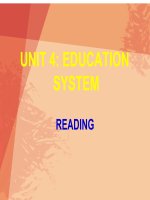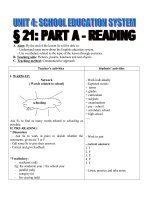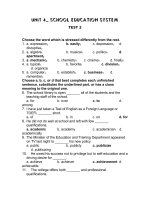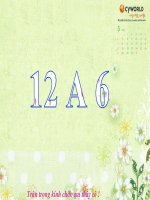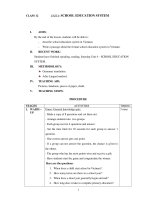Unit 4 School education system
Bạn đang xem bản rút gọn của tài liệu. Xem và tải ngay bản đầy đủ của tài liệu tại đây (640.37 KB, 17 trang )
<span class='text_page_counter'>(1)</span><div class='page_container' data-page=1></div>
<span class='text_page_counter'>(2)</span><div class='page_container' data-page=2>
<i><b>Unit </b></i>
<i><b>Unit </b></i>
<i><b>4</b></i>
<i><b>4</b></i>
<i><b>:</b></i>
<i><b><sub>:</sub></b></i>
<b>School education </b>
<b>system</b>
</div>
<span class='text_page_counter'>(3)</span><div class='page_container' data-page=3>
<i><b>Choose the word which has different stress pattern</b></i>
<i><b>from the rest.</b></i>
1. A . happy
B. reading
C. money
D. agree
2. A. listen
<sub>A</sub>
B. repeat
C. confide
D. refuse
</div>
<span class='text_page_counter'>(4)</span><div class='page_container' data-page=4>
Friday October 2
nd
, 2009
Unit 4 :
<b>School education system</b>
( Language focus )
I. Pronunciation :
Stress in three - syllable words
<i> Listen and repeat these words, then underline the stress </i>
<i>pattern of these words:</i>
1. happy
<sub>2. happiness</sub>
<sub>3. unhappy</sub>
<sub>4. happily</sub>
<i><b> * Chó ý: </b></i>
1. Từ một từ ta có thể tạo ra nhiều từ khác dài hơn bằng cách
thêm vào từ đó tiền tố hoặc hậu tố mà khơng thay i
</div>
<span class='text_page_counter'>(5)</span><div class='page_container' data-page=5>
2
.
Trọng âm rơi vào âm tiết thứ 2 từ cuối lên:
<i> -Với những tÝnh tõ cã hËu tè lµ:</i>
-
ic
<i>( electric , scientific)</i>
<i> -Víi nh÷ng danh tõ cã hËu tè lµ:</i>
-ion, -ian
<i>( calculation, Italian, education)</i>
3. Trọng âm rơi vào ©m tiÕt thø 3 tõ cuèi lªn:
<i> </i>
<i>- Với những từ có hậu tố là : -</i>
y
( chemistry, primary, beautify)
<i>- Víi nh÷ng tÝnh tõ cã hËu tè lµ: </i>
- al
<i>( natural , industrial)</i>
<i><b>* Identify the stress pattern in these words</b></i>
<b>.</b>
</div>
<span class='text_page_counter'>(6)</span><div class='page_container' data-page=6></div>
<span class='text_page_counter'>(7)</span><div class='page_container' data-page=7>
<i> * How to change the active into the passive voice</i>
<b>Active:</b>
<b> S + </b>
<b>V</b>
<b> + O</b>
<b> Passive : </b>
<b>S+ be</b>
<b><sub> + Ved/ V3</sub></b>
Ex, I
<b> </b>
<b>clean</b>
<b> </b>
<b>the living room</b>
<b> everyday.</b>
<b> </b>
-> The living room
<i><b> </b></i>
</div>
<span class='text_page_counter'>(8)</span><div class='page_container' data-page=8>
<b>A</b>
<b>A</b>
<b>B</b>
<b><sub>B</sub></b>
1. Present simple
1. Present simple a. Subject + is / am / are +Ved / V3a. Subject + is / am / are +Ved / V3
2. Present perfect
2. Present perfect b. Subject + were / was Ved/ V3b. Subject + were / was Ved/ V3
3. Present continuous
3. Present continuous c. Subject + had been + Ved/ V3c. Subject + had been + Ved/ V3
4. Past simple
4. Past simple d. Subject + will / shall be + Ved/ V3d. Subject + will / shall be + Ved/ V3
5. Past perfect
5. Past perfect e. Subject + have / has been + Ved/ V3e. Subject + have / has been + Ved/ V3
6. Past continuous
6. Past continuous f. Subject + is/ am / are being + Ved/ V3f. Subject + is/ am / are being + Ved/ V3
7. Simple future
7. Simple future g. Subject + was / were being + Ved/ V3g. Subject + was / were being + Ved/ V3
8. Modal verbs
8. Modal verbs h. Subject + be going to be + Ved/ V3h. Subject + be going to be + Ved/ V3
have to have to
9. Others
9. Others i. Subject + can / could be + Ved/ V3i. Subject + can / could be + Ved/ V3
may/ mightmay/ might
</div>
<span class='text_page_counter'>(9)</span><div class='page_container' data-page=9>
<b>A</b>
<b>A</b>
<b>B</b>
<b><sub>B</sub></b>
1. Present simple
1. Present simple a. Subject + is / am / are + Ved/V3a. Subject + is / am / are + Ved/V3
2. Present perfect
2. Present perfect b. Subject + were / was + Ved/V3 b. Subject + were / was + Ved/V3
3. Present continuous
3. Present continuous c. Subject + had been + Ved/V3 c. Subject + had been + Ved/V3
4. Past simple
4. Past simple d. Subject + will / shall be + Ved/V3 d. Subject + will / shall be + Ved/V3
5. Past perfect
5. Past perfect e. Subject + have / has been + Ved/V3 e. Subject + have / has been + Ved/V3
6. Past continuous
6. Past continuous f. Subject + is/ am / are being + Ved/V3 f. Subject + is/ am / are being + Ved/V3
7. Simple future
7. Simple future g. Subject + was / were being + Ved/V3 g. Subject + was / were being + Ved/V3
8. Modal verbs
8. Modal verbs h. Subject + be going to be + Ved/V3h. Subject + be going to be + Ved/V3
have to have to
9. Others
9. Others i. Subject + can / could be + Ved/V3 i. Subject + can / could be + Ved/V3
may/ mightmay/ might
</div>
<span class='text_page_counter'>(10)</span><div class='page_container' data-page=10>
<b>A</b>
<b>A</b>
<b>B</b>
<b><sub>B</sub></b>
1. Present simple
1. Present simple a. Subject + is / am / are +Ved/ V3a. Subject + is / am / are +Ved/ V3
2. Present perfect
2. Present perfect b. Subject + have / has been + Ved/ V3b. Subject + have / has been + Ved/ V3
3. Present continuous
3. Present continuous c. Subject + is/ am / are being +Ved/ V3c. Subject + is/ am / are being +Ved/ V3
4. Past simple
4. Past simple d. Subject + were / was + Ved/ V3d. Subject + were / was + Ved/ V3
5. Past perfect
5. Past perfect e. Subject + had been + Ved/ V3e. Subject + had been + Ved/ V3
6. Past continuous
6. Past continuous f. Subject + was / were being + Ved/ V3f. Subject + was / were being + Ved/ V3
7. Simple future
7. Simple future g. Subject + will / shall be + Ved/ V3g. Subject + will / shall be + Ved/ V3
8. Modal verbs
8. Modal verbs h. Subject + can / could be + Ved/ V3h. Subject + can / could be + Ved/ V3
may/ mightmay/ might
shall / should shall / should
9. Others
9. Others i. Subject + be going to be + Ved/V3i. Subject + be going to be + Ved/V3
</div>
<span class='text_page_counter'>(11)</span><div class='page_container' data-page=11>
1.She saw this film last night.
1.She saw this film last night.
………
………
2.He will build a new school here next
2.He will build a new school here next
year.
year.
………
………
3.I have learned English for 9 years.
3.I have learned English for 9 years.
……….
</div>
<span class='text_page_counter'>(12)</span><div class='page_container' data-page=12></div>
<span class='text_page_counter'>(13)</span><div class='page_container' data-page=13>
<i><b>Exercise 1</b></i>
<i>.</i>
Fill each blank with the simple present passive
form of the verb in brackets
1. The academic year in England ... in three
terms. ( divide )
2. Each term
… …
...
...by a one- week break. ( separate )
3. The national curriculum...
…
.. by the government
and ...in all state schools. ( set, must follow )
4.The national curriculum ... of more than ten
subjects. (make up )
5. The state school system ... for by the state. (pay )
6. The advanced students ... to take part in the
annual International Olympic Competition. ( select )
<i><b>is divided</b></i>
<i><b>Game</b></i>
<b>:</b>
<b> Lucky star</b>
<b><sub>2</sub></b>
<b><sub>5</sub></b>
<b><sub>4</sub></b>
<b><sub>6</sub></b>
<b><sub>3</sub></b>
<i><b>is separated</b></i>
<i><b>is set</b></i>
<i> </i>
<i><b> must be followed</b></i>
<i><b>is made</b></i>
<i><b>is paid</b></i>
</div>
<span class='text_page_counter'>(14)</span><div class='page_container' data-page=14>
<i><b>Exercise 2.</b></i>
Rewrite the following sentences using the
passive voice
<i>Example:</i>
They built this school in 1997.
->
<i>This school was built in 1997.</i>
1. The students in my class are going to organize a
surprise party tomorrow evening.
...
...
2. They are painting the kitchen now.
...
3. Shakespeare wrote “ Romeo and Juliet” in 1605 .
...
4. They will speak English at the conference.
...
5. Jane hasn’t cleaned the floor yet.
<i>A surprise party is going to be organized by the students</i>
<i> in my class tomorrow evening.</i>
<i>The kitchen is being painted now</i>
.
<i>“Romeo and Juliet was written by Shakespeare in 1605.</i>
”
</div>
<span class='text_page_counter'>(15)</span><div class='page_container' data-page=15>
<b>CONSOLIDATION</b>
<b>1.Circle the word or the phrase that must be changed:</b>
<b>Was this room repainted by he ?</b>
A B C D
<b><sub>D</sub></b>
<b>2.Choose the best option to complete this sentence:</b>
<b>My classroom . . . . everyday</b>
<b>A. is cleans B. cleans C. is cleaned D. was cleaned</b>
<b><sub>C</sub></b>
<b>3.Choose the sentence which has the same meaning to </b>
<b> </b>
<b> the root one.</b>
<i><b> Shakespeare wrote this play in 1605.</b></i>
</div>
<span class='text_page_counter'>(16)</span><div class='page_container' data-page=16>
-
Review the passive voice
- PREPARE UNIT 5
PART A - READING
.
</div>
<span class='text_page_counter'>(17)</span><div class='page_container' data-page=17></div>
<!--links-->
